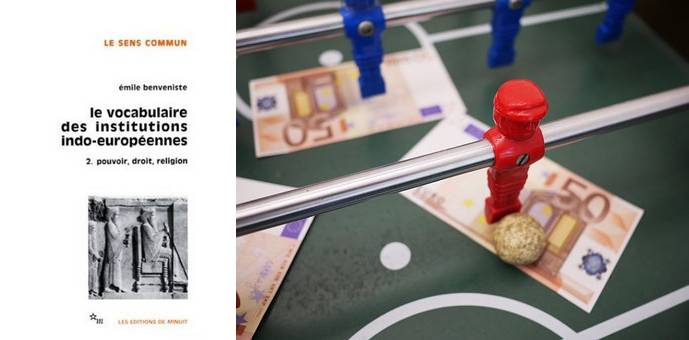Betting can be considered as an opposite (and maybe complementary) paradigm to the one of transparency. As a cultural form and media mythology about uncertainty, betting offers the ground for a willing suspension of transparency. The betting paradigm is the living archive of the transparency paradigm and the model of rationality it relies on. Therefore, we can illuminate the critical dimension of this living archive with regard to the model of the well-informed controversy and the transparent pursuit of truth.
Let’s take another step backwards from the origin of rhetoric
Historians of religion showed that ancient societies hosted a specific type of rationality, different from the institutionalised technical competence known as rhetoric: divinatory rationality. The classical democratic Greek society have marginalised the divinatory rationality in favour of a rhetorical or dialectical rationality, which appropriated the social functions of decision-making, management of uncertainty, and production of authorised and collectively shareable knowledge.

Superstition is not dead
Émile Benveniste very finely reconstructs the semantic path of the word superstition, in order to reload its original meaning: “superstitio is the gift of second sight that allows you to know the past as if you had been present in it, superstes” (Benveniste 1969: 278) [Picture 2]. Blurring the temporal sequence by making oneself present in the past and grabing signs that are supposed to direct action in the future, is still a widespread cultural form. The anthropologist Marina D’Agati (2014) has studied these cultural practices as situations of high uncertainty, in which the choices are very often based on the interpretation of signs, the conversion of non-rational beliefs into laws dictating the bet, or the adoption of a magical relationship to the world. Sports betting, no matter if it potentially relies on particular skills and knowledge likely to affect the outcome of the bet, is also abundantly concerned by superstition.

A game is a political structure
The game is not a simple case to which the remains of divinatory rationality are accidentally applied; it rather concentrates and fulfils all its characteristics. Benveniste (1947) defines it as “a rite without myth”, i.e. as a “desacralising operation”. The game reverses the expected relationship between myth and reality: purely a rite, a ritual, it offers the occasion of an authentic relationship to the world, and considers reality as a myth that has become unintelligible. The gaming condition is consented to, indeed sought after, by those who lend themselves to the game and accept its beliefs, precisely in order to find in it a power of revelation that lived reality denies them.

What is critique about gambling?
Gambling does not allow a clear opposition between “lucid elites” on the one side, and “popular classes blinded” by gambling on the other. The motif of blindness in games resists the traditional gestures of critical thinking, also because it considers that certain forms of blindness, those most radically marked by an affected relationship to reality, have an additional power of derealisation: the power to tear consciousness away from all the other derealisations that characterise common lived experience.
In the Arcades Project, Walter Benjamin presents the game as a hypertrophy of capitalist society and the stock market speculation that dominates it. The bourgeois class, the architect of the capitalist domination of the world, is also the one by which and for which this world escapes any causal intelligibility. Gambling then appears as the primitive and aggressive means of escaping from the blind authority of reality, in order to surrender to another form of blindness, that of shock and catastrophe:
The wager is a means of conferring shock value on events, of loosing them from the contexts of experience […] The ideal of the shock-engendered experience <Erlebnis> is the catastrophe. This becomes very clear in gambling; by constantly raising the stakes, in hopes of getting back what is lost, the gambler steers toward absolute ruin. (Benjamin 2002: 513-515)

Return to rationality, pervasion of blindness
Sports betting is nowadays at the centre of media attention. The debate takes the same shape as the debate about violence on television or about fake news: we need answers in the form of a return to rationality and morality.

Concurrently, we are also witnessing the permanence, and even the spread, of the motif of blindness as an existential modality to face uncertainty, and as a disposition in the ludic scenography. See for instance the label “Blind Auditions”, given to the first stage of the famous TV-show The Voice. See also this advertisement for the sports betting branch of the Belgian National Lottery.
In the same way that elements of the playful scenography are culturally diffused, we also notice that this playful scenography is permeable to elements of language drawn from other topoi of social discourse. For example, the ‘boost’ motif applies as much to stock markets, immunity or CV as to the potential gains of a sports bet.

So blindness needs to be boosted. Surely not because there is a risk of lucidity, but maybe because the current conditions of the isolated human experience require always more the shock of ruin and catastrophe.
References
Benjamin, Walter. (2002). The Arcades Project, translated by Howard Eiland and Kevin McLaughlin, prepared on the basis of the German volume edited by Rolf Tiedemann, Cambridge, Harvard University Press
Benveniste, Émile. (1947). Le jeu comme structure. Deucalion. Cahiers de philosophie, 2, 161-167
Benveniste, Émile. (1969). Religion et superstition. In: Le Vocabulaire des institutions indo-européennes. 2: Pouvoir, droit, religion, Paris, Les Éditions de Minuit, 265-279 D’Agati, Marina. (2014). “I Feel Like I’m Going to Win”: Superstition in Gambling. Qualitative Sociology Review, 10 (2), 80-101

